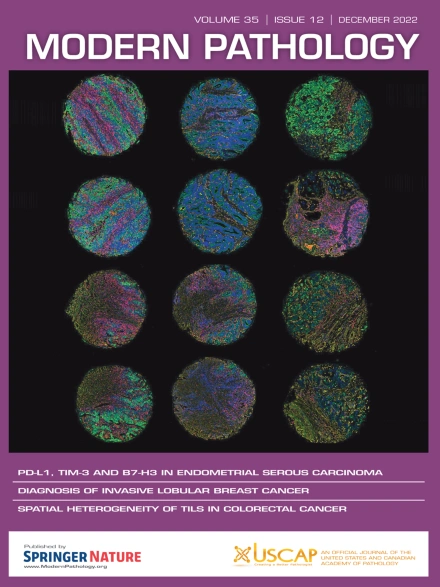Lower Degree of Microsatellite Instability in Colorectal Carcinomas From MSH6-Associated Lynch Syndrome Patients
IF 5.5
1区 医学
Q1 PATHOLOGY
引用次数: 0
Abstract
Numerous observational and molecular studies focusing on Lynch syndrome (LS) have revealed significant variation in the phenotype and molecular characteristics among carriers of pathogenic variants in mismatch repair genes (path_MMR). Recently, we demonstrated that colorectal carcinomas in path_MSH6 carriers exhibit fewer insertion/deletion mutations compared with cumulative colorectal cancers (CRCs) from other MMR groups, raising the question of whether MSH6-mutated CRCs might display a relatively lower degree of microsatellite instability (MSI). Mutations at 20 coding microsatellites (cMS) were analyzed in 39 MSH6-, 18 MLH1-, 16 MSH2-, and 22 PMS2-mutated CRCs and 35 sporadic MSI CRCs, and mutation frequencies and mutant allele ratios were compared among the different MMR-deficient groups. Considering factors such as HLA-A∗02:01 type, B2M status, and the anticipated immunogenicity of frameshift peptides derived from cMS mutations, the identified cMS mutation profiles of MSH6-mutated CRCs were further investigated to assess their potential impact on immunotherapeutic strategies. MSH6-mutated CRCs exhibited lower mutation frequencies and mutant allele ratios across most cMS. Variation in cMS mutation patterns was observed both between different tumor regions and between tumor tissue and adjacent adenomatous tissue. The cMS mutations in MSH6-mutated CRCs demonstrated inverse correlations with the predicted immunogenicity of the resulting frameshift peptides, which may suggest a negative selection of cell clones bearing highly immunogenic frameshift peptides. Overall, MSH6-mutated CRCs display a relatively lower degree of MSI and represent a biologically distinct subgroup of LS-associated CRCs. This lower MSI level may implicate an altered immune response compared with other MSI CRCs, which could have theoretical implications for the success of immunotherapy in MSH6-mutated CRCs. Future studies should carefully evaluate this possibility. If confirmed, these results would reinforce the notion of classifying LS as distinct syndromes associated with specific MMR genes.
msh6相关Lynch综合征患者结直肠癌微卫星不稳定性较低。
大量关注Lynch综合征(LS)的观察和分子研究表明,错配修复基因(path_MMR)致病变异携带者的表型和分子特征存在显著差异。最近,我们证明,与其他MMR组的crc相比,path_MSH6携带者的结直肠癌表现出更少的插入/删除突变,这就提出了msh6突变的crc是否可能表现出相对较低程度的微卫星不稳定性(MSI)的问题。分析了39例MSH6-型、18例MLH1-型、16例MSH2-型和22例pms2突变型和35例散发性MSI突变型的20个编码微卫星突变位点,并比较了不同mmr缺陷组的突变频率和突变等位基因比例。考虑到HLA-A*02:01型、B2M状态和cMS突变衍生的移码肽的预期免疫原性等因素,我们进一步研究了msh6突变的crc的cMS突变谱,以评估其对免疫治疗策略的潜在影响。在大多数cMS中,msh6突变的crc表现出较低的突变频率和突变等位基因比率。cMS突变模式在不同肿瘤区域之间以及肿瘤组织与邻近腺瘤组织之间均存在差异。msh6突变的crc中的cMS突变与预测产生的移码肽的免疫原性呈负相关,这可能表明携带高免疫原性移码肽的细胞克隆存在负选择。总的来说,msh6突变的crc表现出相对较低的MSI程度,代表了ls相关crc的一个生物学上不同的亚群。这种较低的MSI水平可能意味着与其他MSI crc相比,免疫反应发生了改变,这可能对msh6突变的crc免疫治疗的成功具有理论意义。未来的研究应仔细评估这种可能性。如果得到证实,这些结果将加强将LS分类为与特定MMR基因相关的不同综合征的概念。
本文章由计算机程序翻译,如有差异,请以英文原文为准。
求助全文
约1分钟内获得全文
求助全文
来源期刊

Modern Pathology
医学-病理学
CiteScore
14.30
自引率
2.70%
发文量
174
审稿时长
18 days
期刊介绍:
Modern Pathology, an international journal under the ownership of The United States & Canadian Academy of Pathology (USCAP), serves as an authoritative platform for publishing top-tier clinical and translational research studies in pathology.
Original manuscripts are the primary focus of Modern Pathology, complemented by impactful editorials, reviews, and practice guidelines covering all facets of precision diagnostics in human pathology. The journal's scope includes advancements in molecular diagnostics and genomic classifications of diseases, breakthroughs in immune-oncology, computational science, applied bioinformatics, and digital pathology.
 求助内容:
求助内容: 应助结果提醒方式:
应助结果提醒方式:


